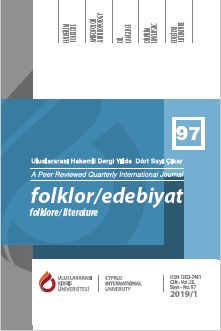Anne Arketipinin Didem Madak’ın Şiirlerindeki İzleri
Traces of Mother Archetype in Didem Madak’s Poems
Author(s): Üyesi Ece Serrican KabalcıSubject(s): Psychology, Turkish Literature, Theory of Literature
Published by: Uluslararası Kıbrıs Üniversitesi
Keywords: Didem Madak; Carl Gustav Jung; archetype; poem; mother;
Summary/Abstract: Archetypes, which are included in the psychology studies that Carl Gustav Jung called “Analytical Psychology”, are behavioral patterns that have been transferred from past to present. The archetypes, which are accepted as “primary pattern/ model”, and which exist outside of humans’ mutual/collective unconscious, are the codes that connect the individual to the universal. One of these codes, the mother archetype, has a trait in human life. Didem Madak, a poet whose “mother archetype” could be traced, lost her mother at a young age and left her three-year-old daughter behind in her forties. Thus, Didem Madak has reflected pain of being motherless to her works. The three works that collect Didem Madak’s poems are titled as Grapon Kâğıtları (2000), Ah’lar Ağacı (2002) and Pulbiber Mahallesi (2007). The poet dedicated her poems to different people just as she did in her books. There are eighteen poems in Grapon Kâğıtları, nine in Ah’lar Ağacı, and fifteen in the Pulbiber Mahallesi. At the end of the Pulbiber Mahallesi; there are four poems which were not included in the books of the poet, but published in journals under the title “Ardından”, the text of her last days from the pen of her close friend Müjde Bilir, and the last poem she wrote, and her last poem named “128 Dikişli Şiir”. In this study, all the poems in the three books were examined based on the archetypal criticism method which was framed by Carl Gustav Jung and the findings obtained by taking the mother archetype in the center were evaluated.
Journal: Folklor/Edebiyat
- Issue Year: 25/2019
- Issue No: 97
- Page Range: 167-182
- Page Count: 16
- Language: Turkish

